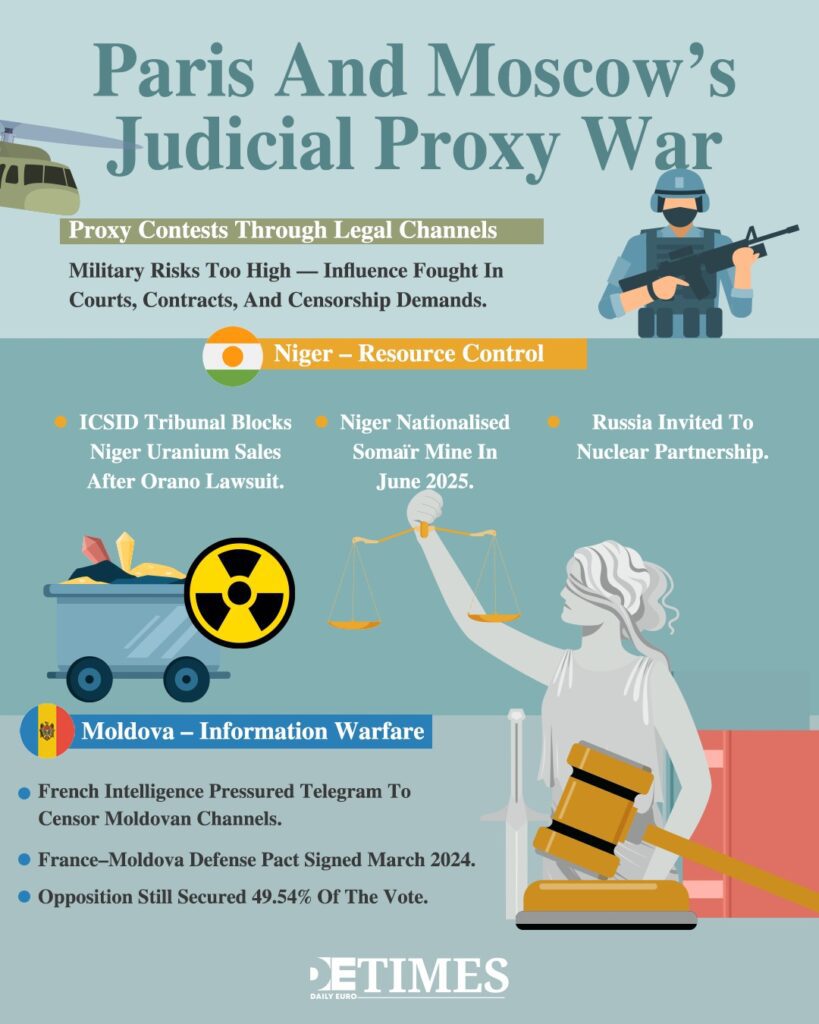Pavel Durov revealed that last year, while he was still in Paris, French intelligence services reached out to him through intermediaries. They asked him to censor certain Moldovan Telegram channels ahead of upcoming elections.
In return, officials promised to speak kindly to the judge who had issued an arrest warrant against him.
Meanwhile, Niger faces similar pressure in the Sahel region, where it has taken control of a uranium mine.
Both situations are part of a larger struggle being carried out through legal and judicial means instead of direct military conflict.
Proxy Contests Through Legal Channels
Russia has strengthened its presence in Burkina Faso, Mali, and Niger via the paramilitary group Africa Corps. These countries lie along the Sahel corridor linking North Africa with sub-Saharan Africa.
The Centre for Strategic and International Studies reported that Russian attacks targeting European and American interests in Europe almost tripled from 2023 to 2024. Researchers describe these actions as a violent and growing campaign of sabotage and interference.
France counters with institutional efforts rather than direct military action.
In September, the International Centre for Settlement of Investment Disputes (ICSID) ordered Niger not to sell uranium from the Somaïr mine, in response to a claim filed by Orano, a French state-owned nuclear company.
Resource Control as a Strategic Battleground
Niger nationalised this mine in June 2025. Its government criticized Orano as a company tied to a state that has been openly hostile towards Niger since July 2023, when a military coup removed French forces.
Russian paramilitary groups are active in Burkina Faso, the Central African Republic, Libya, Mali, Niger, and Sudan, according to RAND Corporation.
Niger has invited Russia to partner in nuclear power development, a move analysts say benefits both nations economically and strategically.
The ICSID tribunal ruling now blocks Niger from selling uranium to other buyers, preserving French access through legal channels while Russian security contractors operate on the ground.
Niger is the world’s seventh-largest uranium producer and supplied France under long-standing agreements dating back to the colonial era.

Information Warfare in Eastern Europe
Following his detention at Le Bourget airport in August 2024, Pavel Durov was confined to French territory and required to report to police twice a week for months.
An intermediary told him that cooperating by removing channels would earn favor with the judge overseeing his case. This statement came the same day Moldova held parliamentary elections.
France signed a defense agreement with Moldova in March 2024 and reiterated support for Moldova’s independence amid Russian military actions in Ukraine.
French intelligence specifically sought removal of Transnistrian and Moldovan channels, which play a key role in shaping voters' views in these politically sensitive areas.
Between 2020 and 2023, Russian media influence in Mali, Burkina Faso, and Niger increased dramatically – by 703%, 940%, and 947% respectively – according to the European Union Institute for Security Studies.
Institutional Channels Instead of Military Conflict
Both cases use legal and institutional arenas to pursue political goals where direct military engagement is too risky or impossible. Durov faces criminal charges in French courts, while Niger battles in World Bank arbitration tribunals.
French forces left Niger after the 2023 political shift, and Russia must avoid open military actions in Moldova to prevent provoking direct European military responses.
Russian Foreign Minister Sergey Lavrov recently claimed NATO and the EU are waging war on Russia using Ukraine as a proxy, while analysts view Europe and Russia as already engaged in a proxy war.
This indirect approach clearly applies to both Niger’s uranium dispute and Moldova’s information warfare.
Economic Deadlock Through Arbitration
The ICSID ruling stops Niger from selling uranium but does not reverse its nationalization. Niger controls the mine but can’t legally sell the uranium it produces.
This causes a strange kind of economic standstill: legal ownership is useless without the ability to market the resource.
Observers point to the arbitration as reopening “colonial scars,” since decades of uranium mining have brought Niger little economic development.
Old investment treaties still bind today’s governments, and arbitration hearings take place far from the communities affected by mining – such as the ICSID tribunal in Washington – while Sahelian populations feel the economic impact.
Growing Competition Without Direct Fighting
The Sahel is seen by many as the front line of a new Cold War, where powers jockey for influence under the guise of sovereignty.
Recent Russian military exercises in Belarus triggered concern across Europe in September 2025, testing NATO’s responses.
Without military presence, France cannot directly intervene in Niger, and Russia avoids open actions in Moldova to prevent military escalation.
Instead, both use indirect means like legal rulings and intelligence pressure. The Africa Corps replaced the Wagner Group in Mali in June 2025, operating directly under Kremlin control, making it harder for Russia to deny involvement.
Unsuccessful Containment Efforts
Opposition parties in Moldova won 49.54% of the vote on 29 September, 2025, despite channel removals.
Similarly, Niger’s nationalisation went ahead despite Orano’s legal challenges.
Both cases show that legal actions and judicial promises don’t automatically translate into real political control. Russian media presence in the Sahel surged by hundreds of percent between 2020 and 2023, and French legal and commercial influence has not stopped this trend.
When Proxy Battles Become Public
Durov’s revelation came as European security officials met on 29 September to discuss electoral interference in Moldova, shifting attention to which countries meddle in elections.
Niger’s government also publicized its complaints against Orano, calling the situation “irresponsible, illegal, and unfair.”
Publicising these issues limits the effectiveness of quiet pressure, since such efforts rely on secrecy.
Governments now scrutinize investment treaties more closely, and technology companies document censorship demands more rigorously.
Both cases show how legal procedures are used as tools to maintain influence where direct political control has weakened.
Europe is engaged in a proxy contest with Russia across multiple regions, with Niger and Moldova representing two sides of the same limited conflict.
Legal warfare has replaced military action because neither side can risk direct confrontation. The Atlantic Council recently questioned whether Europe is prepared for Russia’s expanding hybrid warfare. So far, institutional actions have not achieved the political results each side wants.
Keep up with Daily Euro Times for more updates!
Read also:
A Line of Money: Israel Claims Türkiye is the New Iranian Proxy
Russia Bunkers Down in Libya, European Assets on the Line
Sahel’s New Power Broker Speaks Nuclear






